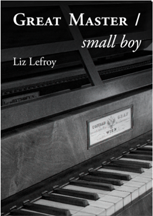GREAT MASTER / small boy, Liz Lefroy
Fair Acre Press, 2021 £5.00
How can we understand ourselves?
Liz Lefroy poses two intertwining questions in this pamphlet. How can we understand ourselves through others? How can we understand ourselves through art as exemplified by poetry and music?
The order of poems mirrors these concerns, flashing back and forth from Beethoven’s family and life to Lefroy and her son. Episodes and scenes from both are juxtaposed, and comparisons are invited. When the poet mentions the absence of Beethoven’s mother in ‘Beethoven-Haus, Bonn’, she follows that up with the first-person plural of her son and herself on their visit to the house:
His home is as his mother might have kept it —
tidied up, waiting.
House of a thousand notes and sorrows,
he’s already left.
He’ll not be back from Vienna this time,
and she’s long dead.
We find it serious — oil portraits, creaking boards,
shuttered windows
Lefroy is implicitly anticipating her own future absence, imagining a time when she and her son will be separated, just like Beethoven and his mother. She draws parallels between lives divided by centuries but united through a shared mother-son relationship.
Perhaps the most representative poem is ‘A Guarantee Between Us’, especially the following lines:
I’m grateful I saw my mother at the piano,
her hair unpinned, her eyes brilliant with joy.
Bach’s music sits in me like a torch, and I passed
it on to you, which means I became momentarily
lost for words the day we were in the car listening
to Beethoven, and you handed Bach back, explained
(hands flying this way and there over imaginary keys)
that faultlessness cannot reach
the wilder kind of paradise. I saw you were already
yourself, felt your confidence as a blessing
This poem portrays the passing of a love of music from one generation to another, exploring its capacity for self-expression within the framework of a family. Life and music merge in Liz Lefroy’s pamphlet, and the reader emerges enriched.
Matthew Stewart
Listening for the intention
I started reading this pamphlet with the poem titled ‘Beethoven’s Apartment, 18A Pasqualati Haus, Vienna’. If you’re unfamiliar with the music of Beethoven, the words ‘This is the birthplace of four symphonies, the violin concerto, / a clutch of quartets, his only opera Fidelio’ may not start violins playing or a fat lady singing in your head.
On the other hand, if you are a Beethoven afficionado, it will.
And depending on your wider musical knowledge, learning that in Vienna Beethoven jostles ‘for focus with Schubert, Mozart, all those Strausses… / not to mention Freud, Wittgenstein, Schrodinger and his damned cat(s)’ might also leave you with silence (the possible miaowing cat(s) being a discussion for another day).
And ifyou don’t read music, you might struggle to understand (in ‘4:4’):
[…] the maths of it
how four goes into four to make
a whole fraction of common time
But if, in primary school, you did music-and-movement and a teacher told you, ‘Crouch down! / Be a bud! / Unfurl! / Be a flower! / Dance!’ (as in ‘Set Up, 1970-Something’),you’ll have no trouble hearing Debussy’s L’Apres-Midi d’un Faune as you move with ‘fleshy awkwardness’ while wearing ‘canvas pull-on plimsolls / black and rubbery’.
I myself did attend just such classes, and the following week, as Carnival of the Animals played, I plodded (as in Liz Lefroy’s poem ‘Balance’) dutifully round the school hall just as the poem describes:
to the double basses of The Elephant,
shoal to the high strings and harmonica of Aquarium,
skip to the xylophone and piano of Fossils
To my horror, I showed so much potential the teacher persuaded my mother to send me to ballet lessons, and while I tried to be graceful at the barre, in the mirror I watched other children in another room doing judo.
I knew immediately I was more cut out for judo than ballet. Which, just for the record (obsolete-technology pun intended) did prove to be the case.
And when, as I progressed, my coach told me to listen for my opponent’s intention; hear their momentum; be alert for any motif, I knew I had found my music as truly and as memorably as the small boy in Liz Lefroy’s poems, her son, finds his.
Sue Butler